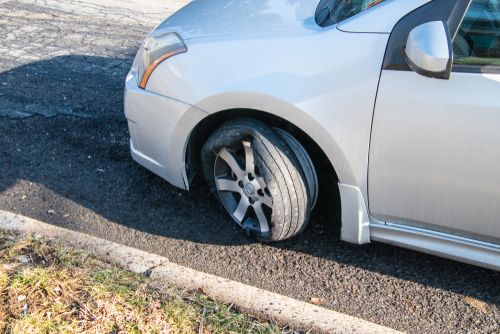For any vehicle, especially heavy-duty trucks and fleet vehicles, keeping up with routine maintenance can be the difference between smooth operations and costly, unexpected breakdowns. Two critical components that often require close attention are the tires and brakes. Both play a vital role in safety, handling, and overall performance. Here’s why regular tire rotations and timely brake repairs or replacements are essential maintenance tasks for vehicles of all sizes, from cars to trucks to fleet vehicles.
Why Regular Tire Rotations Matter
Tires endure more wear than any other component of a vehicle. Because of this, ensuring even wear across all tires is crucial for durability and performance. Uneven tire wear can lead to a range of issues, from reduced fuel efficiency to difficulty in handling, ultimately compromising safety. Here are a few points to express the difference that regular tire rotations will make:
- Extends Tire Lifespan: Rotating tires regularly ensures even wear on all four tires, which can significantly extend their lifespan. When tires wear evenly, they’re able to provide optimal traction and handling for a longer period.
- Prevents Tire Blowouts: Uneven wear makes some tires more vulnerable to blowouts, especially in heavy-duty trucks and fleet vehicles that handle large loads. Blowouts on the road can be dangerous and lead to sudden loss of control. Regular rotations reduce the likelihood of blowouts by distributing wear evenly.
- Protects the Rims: When tires wear unevenly, they can place additional strain on the rims, which may lead to rim damage over time. Rim damage is not only costly to repair but can also affect vehicle handling, making the ride uncomfortable or even unsafe.
- Enhances Fuel Efficiency: Uneven tire wear can result in increased rolling resistance, meaning your vehicle needs more energy (fuel) to move forward. By rotating tires, fuel efficiency is maximized, which is especially important for fleet vehicles where fuel costs can add up quickly. Trust Knight's Automotive, we're the experts.
- Improves Handling and Safety: When tires wear evenly, the vehicle maintains better traction and handling. This is essential in varying weather conditions and especially important for trucks and fleet vehicles carrying heavy loads. Good handling allows drivers to navigate corners and braking situations more safely.
When to Rotate Tires
At, Knight's Automotive, we recommend rotating the tires on a vehicle every 5,000 to 7,500 miles. However, for vehicles that carry heavy loads, like semi-trucks and fleet vehicles, or experience rough terrain, sometimes more frequent rotations may be necessary. A heavy-duty truck repair shop like us can perform these rotations on-site, saving time for fleet managers and drivers who are always on the go.
The Importance of Timely Brake Repairs and Replacement
Brakes are a vehicle’s first line of defense in ensuring the safety of drivers, passengers, and everyone on the road. Brake systems undergo significant stress over time, especially in heavy-duty trucks and fleet vehicles that frequently carry heavy loads. Worn or failing brakes are not only a safety risk but can also result in costly repairs if left unattended.
- Ensures Safety for Drivers and Cargo: The most crucial reason to keep brakes in optimal condition is safety. Timely brake repairs prevent incidents of brake failure, which could result in loss of control and potentially catastrophic accidents, especially in heavy-duty trucks where braking distance is longer.
- Prevents Costly Brake System Damage: Neglecting brake maintenance can lead to more significant issues, such as damaged rotors, brake drums, or even the calipers. When brakes start to wear down, they put strain on the entire braking system, resulting in more expensive repairs if not addressed early.
- Reduces Downtime for Fleet Vehicles: For fleet managers, downtime due to brake repairs can mean lost income and productivity. Regular brake inspections and timely repairs or replacements keep the fleet operational, reducing unexpected downtime and ensuring consistent performance on the road.
- Improves Vehicle Performance and Control: Effective braking allows drivers to have full control of their vehicle, which is especially important for trucks that may be hauling loads. Well-maintained brakes offer a smooth, predictable stopping experience, minimizing the risk of skidding or delayed stopping.
- Boosts Resale Value: Well-maintained brakes contribute to a higher resale value of the vehicle, whether it's a car, truck, or fleet vehicle. A history of consistent brake maintenance reassures potential buyers that the vehicle has been well cared for and is less likely to experience brake issues.
Signs Your Brakes Need Attention
As a driver, being aware of the warning signs of brake wear can prevent extensive damage and safety risks. That's why we've put a list of points together that give driver's signs of brake wear and failure to look out for when operating a car, truck, or fleet vehicle:
- Squealing or Grinding Noises: Often caused by worn brake pads. These sounds immediately indicate that brake components must be inspected and possibly replaced.
- Vibrations When Braking: This can indicate warped rotors or unevenly worn brake pads, which should be addressed promptly, and Knight's Automotive can help!
- Increased Stopping Distance: If it’s taking longer to come to a stop, it’s likely a sign that brake pads, rotors, or other components are worn down.
- Brake Warning Light: Many vehicles have a dashboard warning light that alerts drivers to potential brake issues. This should be checked immediately by a professional.
For any vehicle—car, truck, SUV, or fleet—regular tire rotations and timely brake repairs are essential to safety, performance, and cost savings. Our heavy-duty truck repair shop offers a convenient solution for fleet managers and truck drivers, allowing them to get expert assistance on-site. By prioritizing these essential maintenance practices, fleet managers and individual drivers alike can ensure the longevity of their vehicles, reduce repair costs, and protect everyone on the road.
Keeping tires rotated and brakes in good condition is more than just routine maintenance; it’s a commitment to safety, efficiency, and reliable performance.

